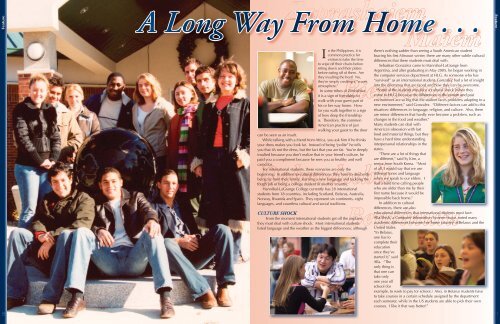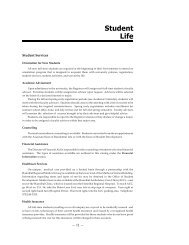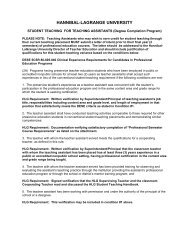The World Comes to HLG - Hannibal-LaGrange University
The World Comes to HLG - Hannibal-LaGrange University
The World Comes to HLG - Hannibal-LaGrange University
- No tags were found...
You also want an ePaper? Increase the reach of your titles
YUMPU automatically turns print PDFs into web optimized ePapers that Google loves.
Feature<br />
A Long Way From Home . . .<br />
n the Philippines, it is<br />
common practice for<br />
visi<strong>to</strong>rs <strong>to</strong> take the time<br />
<strong>to</strong> wipe off their chairs before<br />
sitting down and their plates<br />
before eating off of them. Are<br />
they insulting the host No,<br />
they’re simply creating a “warm<br />
atmosphere.”<br />
In some tribes of Zimbabwe,<br />
Bienvenida<br />
it is a sign of friendship <strong>to</strong><br />
walk with your guest part of<br />
his or her way home. How<br />
far you walk <strong>to</strong>gether is a sign<br />
of how deep the friendship<br />
is. <strong>The</strong>refore, the common<br />
American practice of just<br />
walking your guest <strong>to</strong> the door<br />
can be seen as an insult.<br />
While talking with a friend from Africa, you ask him if he thinks<br />
your dress makes you look fat. Instead of being “polite” he tells<br />
you that it’s not the dress, but the fact that you are fat. You’re deeply<br />
insulted because you don’t realize that in your friend’s culture, he<br />
paid you a compliment because he sees you as healthy and well<br />
cared for.<br />
For international students, these scenarios are only the<br />
beginning. In addition <strong>to</strong> cultural differences, they have <strong>to</strong> deal with<br />
being far from their family, learning a new language and tackling the<br />
Dobrodoshli<br />
<strong>to</strong>ugh job of being a college student in another country.<br />
<strong>Hannibal</strong>-<strong>LaGrange</strong> College currently has 28 international<br />
students from 18 countries, including Scotland, Belarus, Australia,<br />
Norway, Rwanda and Spain. <strong>The</strong>y represent six continents, eight<br />
languages, and countless cultural and social traditions.<br />
From the moment international students get off the airplane,<br />
they must deal with culture shock. Most international students<br />
listed language and the weather as the biggest differences; although<br />
I<br />
there’s nothing sadder than seeing a South American student<br />
braving his first Missouri winter, there are many other subtle cultural<br />
differences that these students must deal with.<br />
Sebastian Gonzalez came <strong>to</strong> <strong>Hannibal</strong>-<strong>LaGrange</strong> from<br />
Argentina, and after graduating in May 2005, he began working in<br />
the computer services department at <strong>HLG</strong>. As someone who has<br />
“survived” as an international student, Gonzalez had a lot of insight<br />
in<strong>to</strong> the dilemmas that are faced and how they can be overcome.<br />
“Some of the students may face a cultural shock [when they<br />
come <strong>to</strong> <strong>HLG</strong>] because the differences in the current and past<br />
environment are so big that the student faces problems adapting <strong>to</strong> a<br />
new environment,” said Gonzalez. “Different fac<strong>to</strong>rs can add <strong>to</strong> this<br />
situation: differences in language, religion, and culture. Also, there<br />
are minor differences that hardly ever become a problem, such as<br />
changes in the food and weather.”<br />
Many students can deal with<br />
America’s obsession with fast<br />
food and material things, but they<br />
have a hard time understanding<br />
interpersonal relationships in the<br />
states.<br />
“<strong>The</strong>re are a lot of things that<br />
are different,” said Sy Kim, a<br />
senior from South Korea. “Most<br />
of all, I would say that we use<br />
different <strong>to</strong>nes and language<br />
when we speak <strong>to</strong> our elders. I<br />
had a hard time calling people<br />
who are older than me by their<br />
first name because it would be<br />
impossible back home.”<br />
In addition <strong>to</strong> cultural<br />
differences, there are also<br />
educational differences that international students must face.<br />
Alla Shtyk, a Computer Information Systems major, noted many<br />
academic differences between her home country of Belarus and the<br />
United States.<br />
“In Belarus,<br />
one has <strong>to</strong><br />
complete their<br />
education<br />
once they’ve<br />
started it,” said<br />
Alla. “<strong>The</strong><br />
only thing is<br />
that one can<br />
take only<br />
one year off<br />
school (for<br />
example, <strong>to</strong> work <strong>to</strong> pay for school.) Also, in Belarus students have<br />
<strong>to</strong> take courses in a certain schedule assigned by the department<br />
each semester, while in the US students are able <strong>to</strong> pick their own<br />
courses. I like it that way better!”<br />
Feature<br />
11










